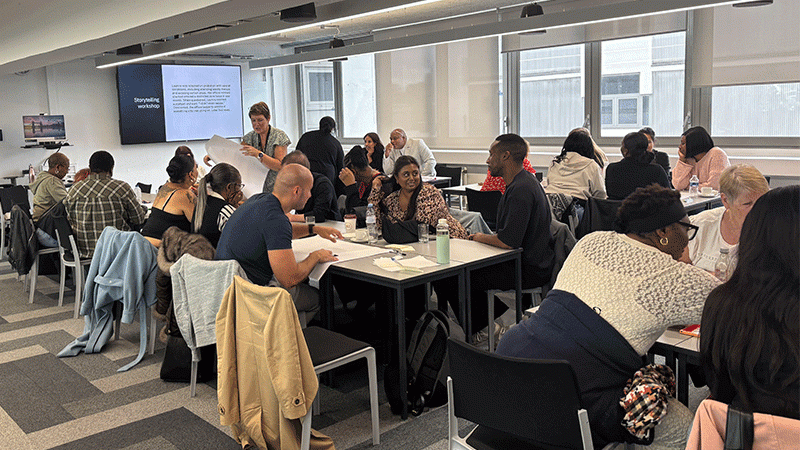The University of Westminster recently hosted a training event for probation officers from the HM Prison and Probation Service (HMPPS) Ealing and Hillingdon Probation Delivery Unit to understand brain injuries. The session taught officers the causes and effects of brain injuries and explored practical ways they can best support people living with them.

Taking place on 4 September, 36 members of the team attended the workshop on the University’s Marylebone Campus. The session was designed and led jointly by Dr Laura Boubert, Principal Lecturer in Psychology at the University, Sharon Dunbar, a probation officer and stroke survivor who has become an advocate for brain injury awareness, and Navodya Henadheera, a recent Westminster Cognitive and Clinical Neuroscience BSc Honours graduate and student intern who has been working as a research assistant on the project that funded the workshop.
The session aimed to give probation officers an understanding of the causes and consequences of brain injuries and explore how they can best support those living with one. The workshop included a mix of theoretical content and interactive activities, beginning with an overview of causes such as strokes, accidents, infections and other conditions.
Attendees then explored how brain injury can affect perception, language, thinking, emotions, mobility and everyday function, as well as the difficulties linked to the condition. They then worked in groups to explore case studies using a story completion framework, allowing the group to reflect on how brain injury can affect an individual’s ability to comply with probation conditions.
The workshop was funded by the Quintin Hogg Trust-funded project titled Blending Co-creation and Lived Experience for an Authentic Module Design and received additional sponsorship towards the event from Irwin Mitchell Solicitors. Running from 2023 to 2026, the project brings together students, academics, clinical neuropsychologists, brain injury charities Headway East London and ATTEND ABI and those with lived experience of brain injuries. Together, they are co-designing educational resources and co-teaching elements for a module on cognitive disorders offered on Westminster's Psychology courses, aimed at improving the understanding of these conditions. The resources have been developed as a series of case studies, known as the ABI Case Studies.
Dr Boubert said: “There are over 330,000 hospital admissions a year due to brain injuries from a range of causes including accidents, strokes and infections which can leave patients with long term difficulties in cognitive, emotional or motor domains. In addition to the recorded and diagnosed cases of acquired brain injury, it’s estimated that up to 60% of those in the criminal justice system, either in prisons or on parole, have a brain injury but only very few have a diagnosis.
“Having a brain injury can lead to difficulties such as increased impulsivity, irritability as well as language, memory and decision making, and research suggests that it can increase a person’s risk of being involved in criminal behaviour. As a result, it’s essential for those working in the criminal justice system to have an understanding of acquired brain injury, how it can affect their clients and critically, how they can best support them with adapted services.”
Lorraine Hewitt, Ealing Probation Officer, added: “The brain injury training was very insightful. Dr Boubert's extensive knowledge on the subject was apparent and she took the time to discuss concerns that individuals raised during break out times. This was enhanced with the lived experience input from our much loved and well-respected colleague Sharon Dunbar. An inspirational and memorable training session. Thank you.”
This training directly contributes to the United Nations Sustainable Development Goals (SDG) 3: Good Health and Wellbeing and 4: Quality Education. Since 2019, the University of Westminster has used the SDGs holistically to frame strategic decisions to help students and colleagues fulfil their potential and contribute to a more sustainable, equitable and healthier society.
Learn more about the lived experience of acquired brain injury in the University’s ABI Case Studies.
Find out more about Psychology courses at the University of Westminster.


